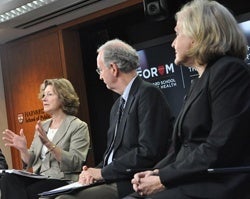June 29, 2012 — In a wide-ranging panel discussion at Harvard School of Public Health (HSPH) on the ramifications of the Supreme Court’s historic health care law ruling, experts addressed some of the biggest questions on people’s minds: How will the ruling affect the November elections? Will most states opt to participate in Medicaid expansion? Will the nation ever get past its seemingly interminable debates about health care?
The June 29, 2012 event was sponsored by The Forum at Harvard School of Public Health.
Addressing one of the most talked-about issues in the wake of the June 28, 2012 ruling—the November elections—Robert Blendon, HSPH professor of health policy and political analysis, said that now that the court battle is over, the battleground shifts to the voting booth.
“Yesterday [June 28] was an historic day, and for many of you it should be over—but it isn’t,” said Blendon. “The country is divided. You now have Republicans, starting with [former Massachusetts] Gov. Romney, down through all the other politicians, who have a simple line: ‘I’ll repeal it.’ ”
Blendon was one of four who spoke at a panel titled “What Now? Health Care After the Supreme Court’s Decision.” Moderated by Reuters health care reporter Toni Clarke, the panel also featured John McDonough, director of the HSPH Center for Public Health Leadership and one of the architects of Massachusetts health reform; Regina Herzlinger, Nancy R. McPherson professor of business administration, Harvard Business School; and Wendy Mariner, Edward R. Utley Professor of Health Law, Bioethics and Human Rights, Boston University School of Public Health.
Although the court upheld the Patient Protection and Affordable Care Act (ACA), Congress can still choose not to fund parts of it, Blendon noted. “If Republicans win the House and the Senate, they’ll saw off financial pieces,” he predicted.
On the other hand, said Blendon, the Supreme Court decision is perceived as a huge win for President Obama, giving him a big political boost in anticipation of the November elections. “Undecided voters like winners,” he noted.
Panelists ranged beyond the presidential campaign to discuss a host of other issues, such as whether or not states will participate in Medicaid expansion; health care cost control; and who will remain uninsured even with the ACA in force.
Medicaid expansion may be slow
The court ruled that states may choose not to participate in the ACA’s Medicaid expansion without penalty. However, doing so means they would forfeit “free money” because the federal government will pay 100% of Medicaid reimbursement costs to states from 2014 through 2017, and 90% of the costs for three years after that. “Some states, at least through November, will say, ‘Heck no, we don’t want to be part of this at all’,” said McDonough. “But this is a strikingly good deal for the states…they will have a lot of conflicting pressures.”
Blendon added that, while it might take a while, he expects states to join the program. When Medicaid began in 1965, he noted, “Some states did not come into Medicaid for almost 12 years, like Arizona and Alaska.” But after a while, he said, all states signed on.
High costs take time to address
While high health care costs remain a major concern, panelists said they think cost control efforts will accelerate as more people become insured. “No one will take cost control seriously until everyone is in the system and everyone is forced to deal with it,” said Mariner. McDonough agreed, noting that, since Massachusetts passed health reform in 2006, it moved from number one in per capita health care costs in the country to number nine. “Once you get coverage out of the way, you are able to focus more intently on cost,” he said.
Herzlinger said the health care law aims to address our “very inefficient, fragmented health care delivery system. Under this legislation, there will be payment [federal incentives] for integrated care. I think that is a tremendously important innovation.”
Co-pays and deductibles will also be controlled under the ACA, McDonough noted. “Around the country, there are many people with [co-pays and deductibles] that are just shocking,” he said, giving the example of people who can’t claim any insurance benefits until they’ve spent $20,000 or $30,000 out of pocket. “That won’t be allowed under the ACA. This will help get at the major issue after un-insurance, which is under-insurance.”
Who will be insured—and who un-insured?
As for whether or not people will choose to buy health insurance rather than paying the penalty, McDonough again cited the Massachusetts example. “There were many claims that the penalties weren’t large enough,” McDonough said. “Some people do pay the penalty. But the truth is we’ve gotten to over 98% coverage. Can [penalties] work? I think we have a good demonstration here in Massachusetts that they can.”
Experts estimate that 32 million Americans will become insured because of the ACA. But about 24 million will remain uninsured. McDonough estimated that about one-third of those will be undocumented immigrants; one-quarter will be eligible for Medicaid but fail to enroll; one-quarter will be people who still can’t afford coverage because of their employment situation; and the rest will opt to pay the penalty. Mariner added that some may live in states that choose not to expand their Medicaid rolls.
The future of debate
In response to a question from an audience member about how long health care will remain a hot-button political issue, Blendon said it all depends on the November elections. “No issue is more polarized,” he said. “It’s a mistake to believe the debate is over.”
–Karen Feldscher
Learn more
Listen to an HSPH podcast with John McDonough (top right of page).
HSPH Forum video: What Now? Health Care After the Supreme Court’s Decision
HSPH Experts on Health Care Ruling: Good News; More Work to Do (HSPH feature)
Balky States Likely to Join Medicaid Expansion (Harvard Gazette)
HSPH experts provided analysis to major news outlets following the Supreme Court’s ruling. Read the latest coverage.
photo: Aubrey LaMedica
